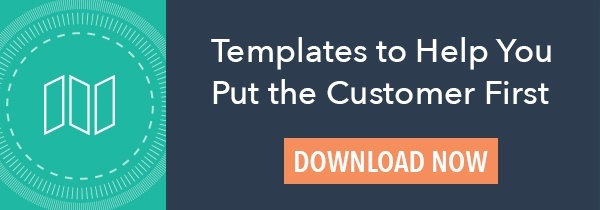Editor's note: This is the first post in an 11-part series on the HubSpot Customer Code. You can subscribe to the full series here.
The business world is obsessed with growth.
We chase it, chart it, and celebrate the moment we’ve captured it -- even temporarily.
I’m no outlier to this global pastime.
Over the last 12 years my cofounder and I have grown HubSpot from a curious idea to an enduring company serving more than 48,000 customers worldwide. I love growth so much that a couple of years ago, when I hand-coded a lovable chatbot I named it GrowthBot.
I love growth so much that a couple of years ago, when I hand-coded a lovable chatbot I named it GrowthBot.
I say all of that so you’ll know I’m not a charlatan when I say this:
Growth alone doesn’t interest me anymore.
Somewhere along the line, growth shifted in our global discourse: From an enabler to an end-goal. When you make growth the end-all-be-all, you lose perspective.
You start to solve for your bottom line above all else, even, at times, at the expense of your customers.
We’ve seen this behavior spike recently as companies — even those we’ve previously loved — have sacrificed long-term relationships for short term gains. And we have the apology tours to prove it.
Apology tours certainly make it easy to draw a line in the sand, point at the spate of behemoths currently taking heat for self-serving decisions, and say, “We would never do that to our customers.” But the truth is that businesses are built on an immense number of decisions — from the incredibly small and seemingly mundane to the very large and lastingly impactful . Any one of those decisions could become the time that you solve for your own growth over your customers’.
No one goes to work intending to shortchange the customer, but when you obsess over short term growth, it happens.
And this is where the obsession with growth breaks down for me.
It’s Not Just Principle, It’s Practical
When we started HubSpot, we got a number of things wrong, but we got one thing very, very right. And that was the realization that customers are in control. We noticed that after years of interruptive marketing tactics, people were leveraging technology (search, ad blockers, spam filters) to usurp marketing they didn’t want, and taking a more proactive approach to finding content that they did.
At the time we focused on the direction of this new landscape — pull versus push, inbound versus outbound. But the lesson was bigger than that. Customers determine their own purchase decisions. You can’t just steal their attention, you have to earn it.
That observation ended up being a massive opportunity. Marketing on buyers’ terms was less expensive and more effective than the traditional push-marketing playbook. That remains true today.
Today — there’s something even better than content at attracting customers — and that is another customer. Word of mouth is now the biggest driver of all new business.
So, do this math with me: If customers are your most effective marketers and you shortchange them to eke out a few extra growth points at the end of the quarter, doesn’t that become devastating to your long term trajectory?
Doesn’t that hollow out the very source of your growth to begin with?
Of course it does. And that has to stop.
Manically chasing growth at the expense of customer goodwill mortgages the future.
Growth that sacrifices the customer experience in any way, isn’t growth at all. It’s debt.
The HubSpot Customer Code: How We’re Committing to Growing Better
HubSpot hasn’t perfected growing better…I haven’t perfected growing better, but I am committed to the idea.
We want to see HubSpot’s network of customers and partners grow big, and grow fast. But more importantly, we want them to grow in a way that builds loyal customers and a sustainable business.
At INBOUND 2018, I unveiled a set of principles that sets the standard HubSpot will hold ourselves to moving forward: The HubSpot Customer Code. This code outlines a shared set of principles and beliefs on how to build a company that customers love.
It’s not about what you sell, but how you sell. It’s about making your customers more successful, building relationships by doing the right thing, and focusing on the long-term even when it’s not the easiest path.
These tenets are:
- Earn my attention, don't steal it.
- Treat me like a person, not a persona.
- Solve for my success, not your systems.
- Use my data, but don't abuse it.
- Ask for feedback, and act on it.
- Own your screw-ups.
- Help me help you, by helping myself.
- I don't mind paying, but I do mind being played.
- Don't block the exit.
- Do the right thing, even when it's hard.
Over the next few months, I’ll be writing a series that dives into how you can bring each of these tenets to life in your own organizations. You can subscribe to the series at the end of this post.
There’s a way to grow that doesn’t compromise the customer experience. That’s the kind of growth I’m excited about. That’s growing better.
This post is part 1 of 11 in a series on HubSpot’s Customer Code. You can find more info on The Customer Code and how we score ourselves here, and watch my INBOUND talk on this topic here:
[Read More ...]

No comments:
Post a Comment